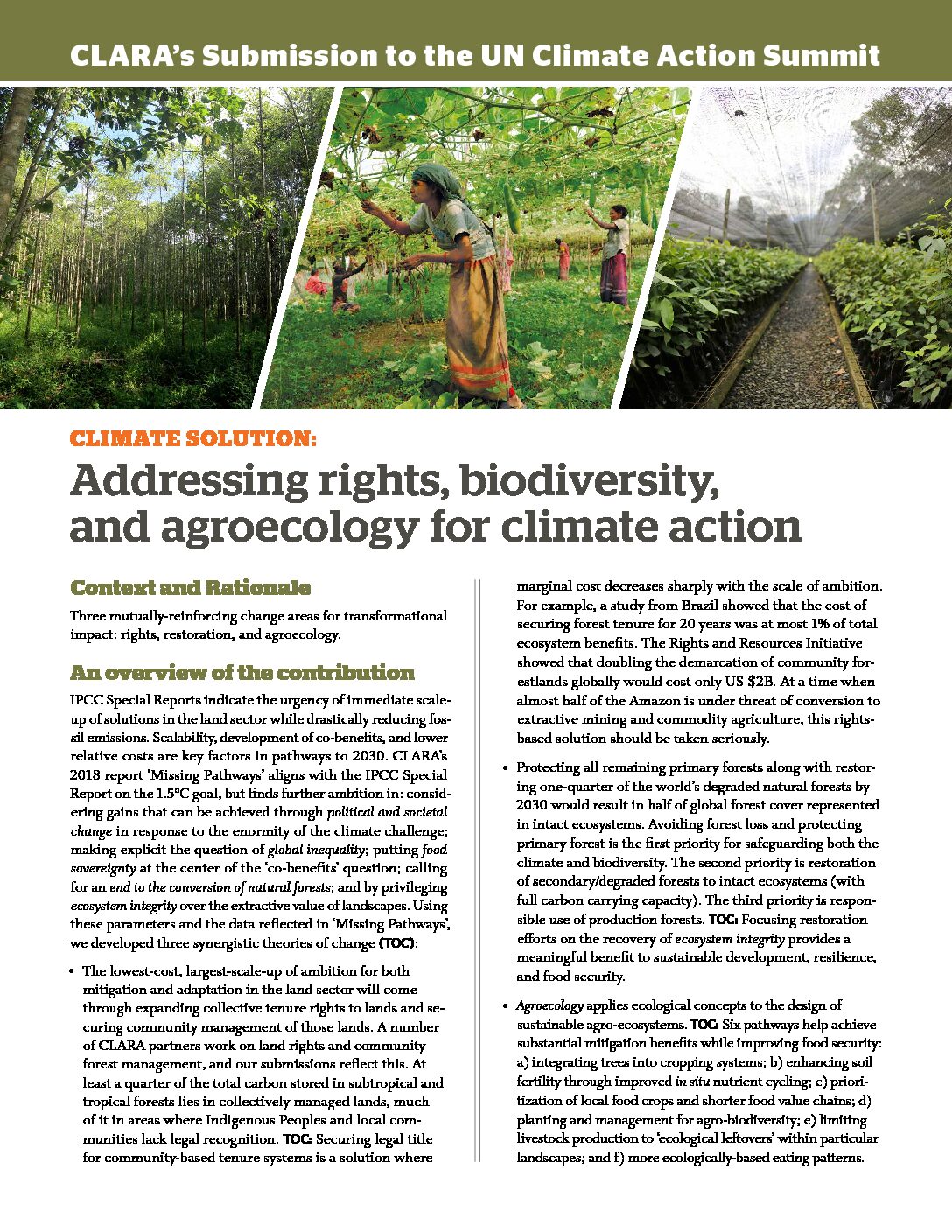Outcomes
Collaboration Mechanism in Place
Mechanisms for citizen engagement are included as part of national climate policy. Mitigation and adaptation plans are clearly communicated to the public. The NDC honors the principles found in the Paris Agreement preamble: “[to] respect, promote, and consider…human rights, the right to health, the rights of indigenous peoples, local communities, migrants, children, persons with disabilities and people in vulnerable situations and the right to development, as well as gender equality, empowerment of women and intergenerational equity.” The NDC includes opportunities for “education, training, public awareness, public participation, [and] public access to information and cooperation at all levels”.
Land & Food Rights in the NDC
An NDC can show respect for rights in many ways. Community and co-managed conservation areas. Farmer involvement in adaptation and livelihood programs. Recognition of indigenous peoples’ land rights. Mangrove replanting programs focused on improving food security and coastal protection. The NDC can also spell out steps the country is taking to guarantee food security and, as part of resilience planning, its readiness to provide emergency relief in case of disasters. The Paris Agreement commitment is to “recognize the fundamental priority of safeguarding food security and ending hunger, and the particular vulnerabilities of food production systems to the adverse impacts of climate change.”
Adaptation Support to Farmers
Safeguarding food security will require significant investment in Adaptation support. Small island states, drought-prone countries, and forest margins in developing countries have particular needs. NDCs should include agroecology as an adaptation response, with appropriate policy supports and extension services. Adaptation action should reflect Paris Agreement Article 7: “follow a country-driven, gender-responsive, participatory, and fully transparent approach, guided by the best available science and, as appropriate, traditional knowledge, knowledge of indigenous peoples and local knowledge systems, with a view to integrating adaptation into relevant socioeconomic and environmental policies and actions.”
Rich countries should provide significant climate finance support for adaptation in developing countries. Adaptation support should take priority over the use of ‘internationally transferred mitigation outcomes’.
Forest Protection and Restoration
Stabilizing the climate requires first to bring fossil fuel emissions in other sectors down to ‘real zero’. Article 5 of the Paris Agreement calls on Parties “to conserve and enhance sinks”, while also noting the importance of incentivizing non-carbon benefits and supporting indigenous and local communities. Forest protection and restoration can play some role in mitigation responses, but it’s most important for the integrated benefits of biodiversity, ecosystem integrity, and climate resilient sustainable development. The NDC should set separate mitigation targets for fossil fuels and for land use. It should acknowledge that carbon stored in natural ecosystems is not replaceable in the very short time frames necessary to address climate change, and thus should adopt a ‘no deforestation’ policy. Countries should also commit to ending imports from market actors who benefit from deforestation.
Finance Serves Community Needs
Financial commitments should be part of rich-country NDCs. Grants and non-market mechanisms should be part of that climate finance commitment. This commitment is spelled out at Articles 9.4 and 9.5 of the Paris Agreement.
Developing country governments can do much more to facilitate ‘direct access’ of climate finance. The NDC should be as specific as possible with respect to financing needs. Transparency and community engagement is also a necessary part of climate finance. Climate change adaptation and mitigation strategies should be mainstreamed into national budgeting processes. The NDC can provide guidance on how to accomplish that mainstreaming.
